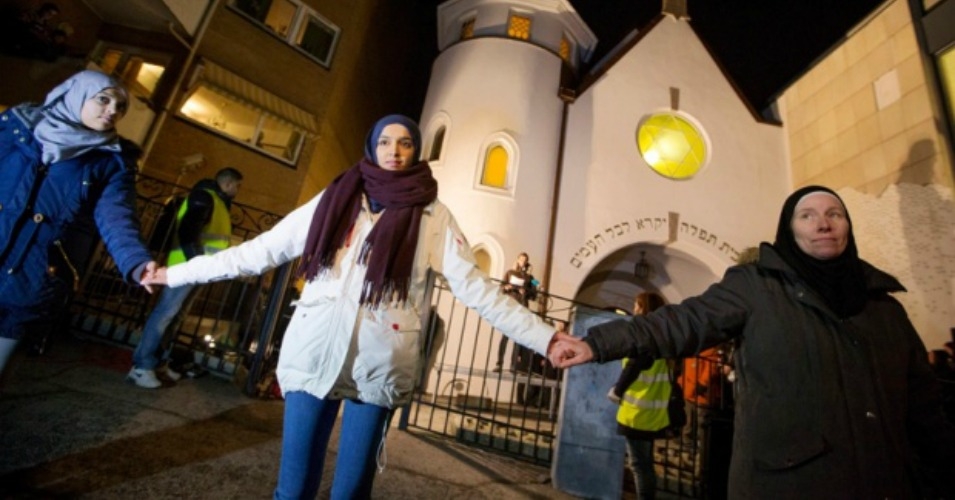Warning: This post contains spoilers about the season three finale of “Homeland.”
You would think Allahu Akbar was synonymous with “Death to America!” if you watched the final two pulse-pounding episodes of Showtime’s Homeland season three. A multitude of Allahu Akbars serve as the backdrop in the horrific public hanging scene of last night’s season finale, “The Star.”
In “Big man of Tehran,” the penultimate episode, commoners in the streets of Tehran chant nearly a dozen celebratory Allahu Akbars upon recognizing alleged Langley bomber and American fugitive Nicholas Brody.
Akin to using music in film to manipulate the audience’s emotions, inserting Allahu Akbars in the background achieves the same effect of evoking emotion. Courtesy of Hollywood spy thrillers and footage of heinous acts by religious militants, this Pavlovian conditioning of repeat pairings of Allahu Akbar with anything terror-related creates the conditioned response of fear upon just hearing the phrase, which simply means, God is Greater. Notorious anti-Islam blogger Pamela Geller goes as far as describing the chant as “bloodcurdling.” For those who watched Sunday night’s episode, I am certain even the most liberal non-Muslim Americans would now feel a chill, at the very least, rip through them if they were to hear an Allahu Akbar out in public.
For Muslims, to whom the phrase belongs, it can evoke a whole host of sentiments. The observant Muslims who perform the five daily prayers say a meditative Allahu Akbar a minimum of 107 times a day. Beyond prayer, the phrase is used in a multitude of contexts: upon receipt of good or bad news (think OMG), as a form of applause, as a call for prayer, and, yes, even as a call for war in times of battle. One of the more important usages, though, is to conjure a sense of awe.
Recently, awe-inspiration has become discussion topic in TIME magazine, Psychology Today, and in a TED Talk with Alain de Botton. They delve into the human need, for both believers and doubters alike, to experience a feeling of reverence. Studies show that when people are awe-inspired they gain perspective, and feel as though time has become more expansive. The recognition that we are small in contrast to something vast and far greater than ourselves can come upon us if we trek out to the Grand Canyon or catch a breathtaking sunset, but it’s not something we can easily experience on a regular basis. Through meditation, imagery, or repetitious chants, however, practitioners of many faiths are able to drum up these beneficial sentiments. The association of the Allahu Akbar with terrorism, however, is eroding this centuries old expression.
I don’t mean to place so much blame on the hit series Homeland. Like many others, I enjoy watching spy thrillers, in part because the genre has come a long way from its one-dimensional portrayals of brute Russian or German villains, of whom audiences had grown weary. Casting villains as militants hailing from Muslim majority countries does feel current and more relevant. While Homeland does incorporate some “good” American Muslims working within the CIA, like Danny Galvez in season one and headscarf-wearing Fara Sherazi in season three, both had tremendous suspicion built around their characters for most of the episodes in their respective seasons for no reason beyond their Muslim identities. So while Homeland does portray some multi-dimensionality of all sides, the final episodes seem to take a step back from that more nuanced, progressive approach.
When it is believed that Brody is behind the CIA headquarter’s attack killing 219, everyday Iranians appear honored to have a mastermind bomber walking the streets of Tehran. When Brody redeems himself in the final episode, the scenes that come forth further deepen the ‘clash of civilizations’ paradigm.
Moments before the noose goes around his neck, Abu Nazir’s darkly veiled widow, once like family to Brody, spits on his face amidst chants of Allahu Akbar paired with solemn, ominous music in the periphery. His body is pulled up by a crane just before sunrise prayer, and a pregnant Carrie, in a headscarf with kohl-lined eyes, cries out her love’s name helplessly. It’s gutting. I was reminded of journalist Daniel Pearl’s pregnant wife futilely pleading with her husband’s kidnappers to release him in the final moments leading up to Pearl’s public decapitation. Such disturbing scenes have the power to incense an audience with hatred and fear; after Homeland’s finale Twitter was afire with expressions of horror and shock, like @SweetnesT’s tweet: “i cant believe ppl gather to watch. #barbaric #Homeland.” Writers of the fourth season, take note. How about a scene in the next season with Fara Sherazi, our lone “good” Muslim, exclaiming “Allahu Akbar!” in a positive context, like a glorious sunrise or upon the birth of Carrie’s daughter? How about we reverse this negative association?
Not too long ago, I was at the Philadelphia International Airport with my family on our way to Canada. Out of the blue, my four-year-old belted out his version of the chant, “Alla Abarr, Alla Abarr!” I froze, puzzled. I then remembered he went to the mosque the day before with my husband and must have heard the Imam say “God is Greater.” In a private setting, I would have found it cute. In this public setting, I just wanted him to hush up. Should it be this way? Should I as a mother tell my children to continue on coloring their public school crafts of menorahs and Santa Clause all the while keeping their Muslim expressions private because it has come to be erroneously associated with terror?
Shazia Riaz is the Events Manager at Altmuslimah.





